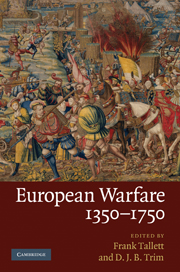Book contents
- Frontmatter
- Contents
- List of figures
- List of maps
- List of tables
- Notes on contributors
- Acknowledgements
- Note on the text
- List of abbreviations
- Maps
- 1 ‘Then was then and now is now’: an overview of change and continuity in late-medieval and early-modern warfare
- 2 Warfare and the international state system
- 3 War and the emergence of the state: western Europe, 1350–1600
- 4 From military enterprise to standing armies: war, state, and society in western Europe, 1600–1700
- 5 The state and military affairs in east-central Europe, 1380–c. 1520s
- 6 Empires and warfare in east-central Europe, 1550–1750: the Ottoman–Habsburg rivalry and military transformation
- 7 Ottoman military organisation in south-eastern Europe, c. 1420–1720
- 8 The transformation of army organisation in early-modern western Europe, c. 1500–1789
- 9 Aspects of operational art: communications, cannon, and small war
- 10 Tactics and the face of battle
- 11 Naval warfare in Europe, c. 1330–c. 1680
- 12 Legality and legitimacy in war and its conduct, 1350–1650
- 13 Conflict, religion, and ideology
- 14 Warfare, entrepreneurship, and the fiscal-military state
- 15 War and state-building
- Bibliography
- Index
15 - War and state-building
Published online by Cambridge University Press: 05 June 2012
- Frontmatter
- Contents
- List of figures
- List of maps
- List of tables
- Notes on contributors
- Acknowledgements
- Note on the text
- List of abbreviations
- Maps
- 1 ‘Then was then and now is now’: an overview of change and continuity in late-medieval and early-modern warfare
- 2 Warfare and the international state system
- 3 War and the emergence of the state: western Europe, 1350–1600
- 4 From military enterprise to standing armies: war, state, and society in western Europe, 1600–1700
- 5 The state and military affairs in east-central Europe, 1380–c. 1520s
- 6 Empires and warfare in east-central Europe, 1550–1750: the Ottoman–Habsburg rivalry and military transformation
- 7 Ottoman military organisation in south-eastern Europe, c. 1420–1720
- 8 The transformation of army organisation in early-modern western Europe, c. 1500–1789
- 9 Aspects of operational art: communications, cannon, and small war
- 10 Tactics and the face of battle
- 11 Naval warfare in Europe, c. 1330–c. 1680
- 12 Legality and legitimacy in war and its conduct, 1350–1650
- 13 Conflict, religion, and ideology
- 14 Warfare, entrepreneurship, and the fiscal-military state
- 15 War and state-building
- Bibliography
- Index
Summary
Traditional accounts of the period with which this volume is concerned assume that state-building and war interacted almost permanently in ways that shaped both the structure of the late-medieval and early-modern state, and the framework and scope of warfare. The pressure warfare exerted on monarchies and republics alike to mobilise new resources has often been seen as one of the driving forces of the process of state-building. However, a number of chapters voice reservations about this, and in fact recent research in Britain, Germany, and elsewhere has called into question the entire process of state-building in its traditional sense. Indeed, any approach that subscribes to some sort of theory of modernisation has become widely unpopular in early-modern studies, and merely talking about state-building implies that in one way or another a process of modernisation did take place. Of course, military history as opposed to cultural history, for example, which tends to see the past more as a system of self-referential symbols and meanings, would probably find it quite difficult to abandon the idea of modernisation entirely, if only in the technical sense of a move towards greater efficiency, greater firepower, greater degrees of ‘Vickers hardness’ and so on. Moreover, it is difficult to tell a coherent story about long-term changes in military history without some sort of teleological approach, as many historians would argue.
What we should bear in mind is that the notion of modernity has become more ambiguous and contradictory than in the past.
- Type
- Chapter
- Information
- European Warfare, 1350–1750 , pp. 322 - 337Publisher: Cambridge University PressPrint publication year: 2010
- 1
- Cited by



